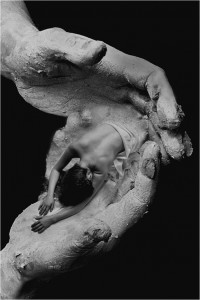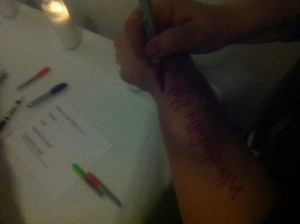 This week a video went viral on the Internet. Not some cloyingly cute thing with kittens and not the Why I Hate Religion but Love Jesus video. It was much more disturbing than that. No, this video was of American soldiers urinating on the dead bodies of supposed Taliban soldiers.
This week a video went viral on the Internet. Not some cloyingly cute thing with kittens and not the Why I Hate Religion but Love Jesus video. It was much more disturbing than that. No, this video was of American soldiers urinating on the dead bodies of supposed Taliban soldiers.
Mohsin Naquvi, a director of the Islamic Information Center in Washington was quoted saying that
“A dead body … is the property of God, and the property of God is to be respected.”[1]I just kept dwelling on that quote this week: human bodies are the property of God and to be respected.
The more I thought about that the more convinced I became that this is what we hear and sing and know in the 139th Psalm when the Psalmist writes of God:
For it was you who formed my inward parts; you knit me together in my mother’s womb.14I praise you, for I am reverently and wonderfully made.
Perhaps this, the belongingness of human bodies to the Almighty, should be the basis for an ethic of war and economics and religion.
Because both the bodies of those dead soldiers and the bodies of the ones who desecrated them were all knit together in their own mother’s wombs by God. This is political.
Every human body is knit by God, known by God and as we learn in Genesis 2 that God breathed into dust and created humanity so our bodies are actually animated with the very breath of God.
So the belongingness of human bodies to God may be political, but it is also deeply personal.
Star Trek fans will tell you of an episode in the original series in which a superior species, which had no bodies and was only reason and cognition, had a great name for humans. They called us “ugly bags of mostly water”. Sometimes in my house we use this as a term of affection for one another.
It’s not hard to agree that were we more evolved as a species we would no longer need bodies. I mean, bodies are just so inconvenient. They break and grow old, need sleep, demand food, get fat, acquire acne, and produce embarrassing noises. Our bodies are so often just disappointments to us. But what better time to consider the sacredness of human bodies than in the New Year in America – a time when we annually punish our bodies through rigorous exercise and deprivation to make up for abusing our bodies last month through gluttony and over consumption.
And of course there’s a multi-billion dollar industry poised to solve the problem of us having bodies which disappoint. For a price they will stretch your skin, vacuum out fat, insert in silicone, break your nose, inject poison in your face, and apply chemicals to your scalp. Which all feels to me like things prevented by the Geneva Convention. Sometimes it’s hard to tell the difference between Cherry Creek and Internment facilities. Torture is torture. It’s just for some reason here we pay money for it.
So here’s my suggestion: the church should open a shop right in the middle of all the Botox and liposuction clinics where for free anybody could walk in and we’d tell them that their bodies are wonderfully knit together by God. That their bodies are holy and beautiful to the one in whose image they were created. And then maybe we could serve them bread and wine.
Because the belongingness of human bodies to God is not just political and personal, it’s also spiritual.
Yet you don’t have to look far to find that there are many forms of Spirituality that are disembodied, in which the flesh is forced into submission. As much as I love the medieval mystics they were totally into this. And we come by it honestly in Christianity. Meaning that, thanks to Roman imperialism, the writers of the New Testament were ensconced in Greek thought. Intrinsic to the Greek way of thinking is that on the one hand there is flesh, which was base, and lower; on the other hand there is spirit which is elevated and higher than flesh; and ne’r the 2 shall meet. To be “spiritual” then was to transcend the evils and demands of the body. But that is far from a Hebrew way of thinking. And the true spiritual origins of Christianity are more Hebrew than Greek.
When we think of it, so many of our personal and societal problems stem not from a lack of ethereal disembodied spirituality but stem from not considering our created, physical reality to be holy. Bodies, streams and rivers, flora, fauna, food. I just don’t think that the world can afford a disembodied spirituality any more.
So let us remind each other that every human body is the same in form as the one taken on by God in the incarnation of Christ. That God slipped into skin and walked among us as Jesus Christ. Who ate with riff-raff, kissed lepers, drank wine, washed the dirty feet of his faltering friends, made mud out of spit and dirt to heal the blind and said “Follow me”. We see in Jesus that a physical life is a spiritual life. And even after his torture and death when he was raised from the tomb he was not raised as a disembodied spirit floating around like an a ghost….no, at the end of Luke’s Gospel he ate grilled fish on a beach.
And in those last days Jesus told us he is present when we gather around an actual table and take a literal chunk of bread into our bodies. There’s nothing disembodied about it. If anything it’s disturbingly physical.
So even if your body disappoints and is seen as imperfect by the mirrors of culture, you are nothing less than a walking miracle of flesh knit together by God and animated by God’s own breath. And this is nothing less than grounds to bless our own and indeed all human bodies with the dignity afforded them by their creator. For they are all – every one of them reverently and wonderfully made by God.
So listen again to Psalm 139 re-told
1The Lord has searched you and known you.
13For it was God who formed your inward parts; and knit you together in your mother’s womb.
14 praise God, for you are reverently and wonderfully made and wonderful are God’s works
And nothing else gets to tell you who you are.
___________________________________________
(during Open Space – a time of response and reflection following the sermon – we invited people to write “hand-knit by God” or “wonderfully made”on themselves.)
[1] http://m.npr.org/news/front/145117940
















